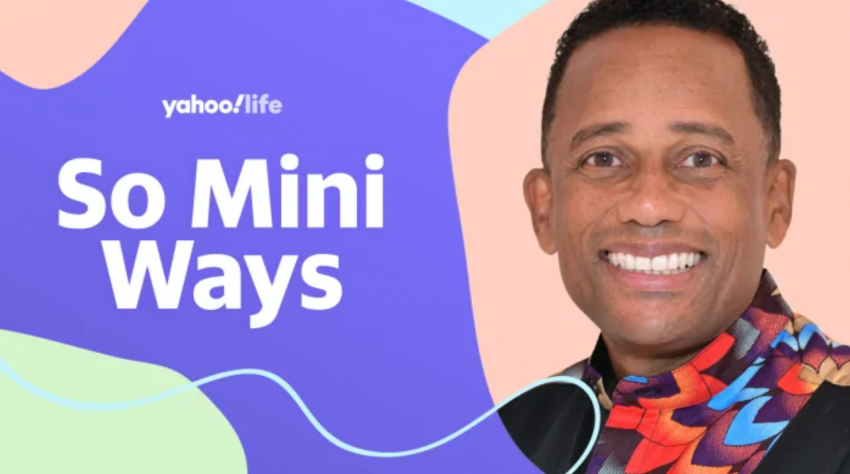You’d be hard-pressed to find a richer (or more impressive) actor than Hill Harper. Though fans are most familiar with him from his stint on CSI: NY “and” The Good Doctor, “but the star, who has three degrees from Brown and Harvard, has carved out space outside Hollywood as an activist, author, entrepreneur, financial expert, And recently hosted NortonLifeLock’s new tech podcast “5-Factor Authentication.” Despite the accolades, nothing prepared Harper when life threw him one of its biggest curveballs – and most rewarding roles – as a father. When Harper was in his late 30s, he was asked to adopt a newborn boy whose mother was homeless; The single father completed the adoption in 2017.
“I had never changed a diaper in my life, and three weeks later I was holding a newborn baby in my hands,” the “He Got Game” star, who suddenly became a father seven years ago, told Yahoo Life.
It’s not that Harper, 56, has never wanted to be a father; He just thought his path to parenthood would be more traditional — including getting married first. A close friend noted that he had long expressed a desire to become a parent, both by having children with his wife and by adopting children.
“You let your relationship status dictate your parenting status,” she told the actor. “What are you waiting for?” Why don’t you think about it differently?”
He put off.
“I said, ‘No…. I want to get married, I want to have kids, [but] I’m definitely going to adopt [later], ‘” he recalled. “God and the world have different plans.”
Undeterred, Harper’s friend put him in touch with an adoption attorney, who shared more information about the process and eventually called the TV star to say the baby who would become his son needed a home. Harper said he was “petrified” but said yes.
A baby coach helped the novice nappy master some of the basics of parenting, and the actor laughed as he recounted joining a list for moms who need frozen breast milk. “I hope to make a movie about this one day,” he said.
Being a single dad is still tricky. Noting that most of the parents he interacts with during school drop-offs are moms, Harper said something as simple as setting up a play date for his now 7-year-old son can lead to embarrassment.
“They’ll say, ‘Should I give you my number? It might upset my husband, ‘” he said. “I said, ‘Look, that’s between you and your husband, whatever. ‘” So it’s funny because I don’t fit into the traditional mom circle.”
He, too, is exploring the nuances of raising a son without the companionship of a traditional mother, and the “sadness” that absence can bring.
“I never realized that everything was centered around mom,” Harper said. “It’s like, in every book, everything is like, ‘My mom, my mom,’ and that always makes me feel a certain way, because Pierce doesn’t have that traditional mom in her life. I always think, does he feel left out?”
Harper named her son Pierce after Pierce Brosnan. Brosnan, who produced and starred in Harper’s 1998 film Nephew, is “a very close friend”.
“He and I have been friends ever since and I have a lot of respect for him,” Harper explained. “I always said to myself, if I ever have a son, I want him to be like Pierce Brosnan, because Pierce is the coolest guy. He’s relaxed, he’s happy, he’s fun. He’s an artist, he’s smart, he cares about people. So when it came time to name Pierce, I thought, you know what? . . I like to bring them together.”
Pierce Jr. had just returned from a surfing and skating camp, and Harper said he enjoyed exposing his son to new and exciting experiences. He added that as a father he thought he was “not strict enough”.
“I deliberately made a very different decision from my father, and I don’t know if it was the right decision,” he said. “My father was a very strict father; It’s like being in the army. To be honest, there are certain aspects of my life that I do well because it creates a real rigidity, a real respect and discipline, and I operate accordingly. I didn’t get into a lot of trouble; I’m not that kid.
“I give my son a much wider bandwidth,” he added. “Maybe it’s because I’m an older parent, maybe it’s because I have at least a sense that he’s still his own man and he’s going to find his own way. Of course kids need boundaries and containers, and I’ve been trying to find out what those are, but I think I’ve given him a lot of leeway to just be himself.”
When it comes to screen time and game time, however, Harper is a stickler. Pierce is not allowed to watch too much TV, are not allowed to play too many video games, although as a factor in his five notice podcast on science and technology, Harper admits he doubted if she ignored the so-called benefits of game, such as hand-eye coordination, programming skills and so on – “in the world in a new school for his instill an old-fashioned view”.
Speaking about issues such as cybersecurity and social media, Harper said he was drawn to the way technology shapes our personal lives. As a parent, he said, “I think about technology all the time.”
A lot of research has tried to predict how technology will change the learning process in the future and what that will mean for his children. Recalling that most of his most memorable classmates at Brown and Harvard were multilingual and proficient in a musical instrument, Mr. Harper enrolled Mr. Pierce in a Chinese-immersion school. (He has tried, unsuccessfully, to teach his son a musical instrument.) But are there plenty of new learning resources and shortcuts available that most of us can’t even imagine once, as his tech-savvy friends say, his son reaches his 20s and those lessons become obsolete or unnecessary? In the age of calculators and computers, is it still worth teaching long division?
These are questions Harper asks himself, but ultimately he wants his son to be “comfortable with technology and not afraid of it.”
As his son started a new school year, Harper marveled at how much his life had changed when, as he put it, “Pierce chose me to be his father.” First and foremost, stop worrying that you’re not up to the task of adoption.
“I think there are a lot of people who can take it,” he said. “A lot of people have inner desires, but they’re afraid. Fear often prevents us from making decisions that we know deep down we should make. I always refer to fear as “false evidence appearing true”. Most of our fears are wrong…. [But] I was confronted with something that was very clear: the best option for my son was to be my son.
“I know I have the ability, the ability and the resources,” he added. “But I don’t know what all the externalities are and all the different things that come with that, what that means. So it’s been a beautiful, interesting and challenging journey.”




